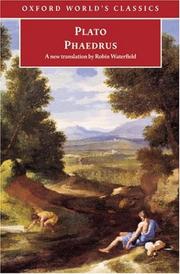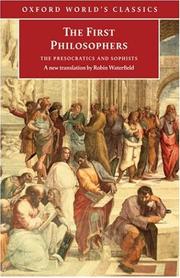| Listing 1 - 3 of 3 |
Sort by
|

ISBN: 0191875368 1280374896 0191589535 0585486123 9780585486123 9780191589539 0192802771 9780192802774 9786610374892 6610374899 0199554021 9780199554027 Year: 2002 Publisher: Oxford New York
Abstract | Keywords | Export | Availability | Bookmark
 Loading...
Loading...Choose an application
- Reference Manager
- EndNote
- RefWorks (Direct export to RefWorks)
Phaedrus is widely recognized as one of Plato's most profound and beautiful works. It takes the form of a dialogue between Socrates and Phaedrus and its ostensible subject is love, especially homoerotic love. This new translation is accompanied by an introduction and full notes that discuss the structure of the dialogue and elucidate issues that might puzzle the modern reader.
Love --- Rhetoric --- Filosofia antiga. --- Filosofia grega. --- Kommentar. --- Love. --- Retórica latina. --- Rhetoric. --- Plato, --- Phaedrus, --- PlatÃo, --- SÓcrates,

ISBN: 1280680105 9786613657039 0191592471 9780191592478 0192824546 9780192824547 019953909X 9780199539093 0191605069 Year: 2000 Publisher: Oxford Oxford university press
Abstract | Keywords | Export | Availability | Bookmark
 Loading...
Loading...Choose an application
- Reference Manager
- EndNote
- RefWorks (Direct export to RefWorks)
These first philosophers paved the way for the work of Plato and Aristotle - and hence for the whole of Western thought. This is a unique and invaluable collection of the works of the Presocratics and the Sophists. Waterfield brings together the works of these early thinkers with brilliant new translation and exceptional commentary. This is the ideal anthology for the student of this increasingly appreciated field of classical philosophy. - ;The first philosophers paved the way for the work of Plato and Aristotle - and hence for the whole of Western thought. Aristotle said that philosophy begi
Pre-Socratic philosophers. --- Sophists (Greek philosophy) --- Philosophy, Ancient --- Pre-Socratics --- Presocratic philosophers --- Presocratics --- Philosophers --- Filosofia antiga. --- Filosofia grega. --- Försokratiker. --- Pré-socráticos. --- Présocratiques. --- Quelle. --- Sofistas. --- Sofisterna. --- Sophistes grecs. --- Sophistik --- Sophistik. --- Sophists (Greek philosophy). --- Vorsokratiker --- Vorsokratiker. --- Pre-Socratic philosophers --- History of philosophy
Book
ISBN: 303022161X 3030221601 Year: 2019 Publisher: Cham : Springer International Publishing : Imprint: Palgrave Macmillan,
Abstract | Keywords | Export | Availability | Bookmark
 Loading...
Loading...Choose an application
- Reference Manager
- EndNote
- RefWorks (Direct export to RefWorks)
This book argues that according to Metaphysics Zeta, substantial forms constitute substantial being in the sensible world, and individual composites make up the basic constituents that possess this kind of being. The study explains why Aristotle provides a reexamination of substance after the Categories, Physics, and De Anima, and highlights the contribution Z is meant to make to the science of being. Norman O. Dahl argues that Z.1-11 leaves both substantial forms and individual composites as candidates for basic constituents, with Z.12 being something that can be set aside. He explains that although the main focus of Z.13-16 is to argue against a Platonic view that takes universals to be basic constituents, some of its arguments commit Aristotle to individual composites as basic constituents, with Z.17’s taking substantial form to constitute substantial being is compatible with that commitment. .
Philosophy, classical. --- Greek philology. --- Classical Philosophy. --- Greek. --- Classical philology --- Greek language --- Greek literature --- Philosophy, Ancient. --- Greek language. --- Classical languages --- Indo-European languages --- Greek philology --- Ancient philosophy --- Greek philosophy --- Philosophy, Greek --- Philosophy, Roman --- Roman philosophy --- Metafísica --- Substància (Filosofia) --- Filosofia antiga --- Aristòtil, --- Filosofia clàssica --- Filosofia --- Ciència antiga --- Cosmologia antiga --- Eleàtics --- Epicureisme --- Estètica antiga --- Estoïcisme --- Filosofia grega --- Filosofia romana --- Gnosticisme --- Maniqueisme --- Megàrics --- Neoplatonisme --- Orfisme --- Filòsofs antics --- Realitat --- Quatre elements (Filosofia) --- Ésser (Filosofia) --- Ontologia --- Subjecte (Filosofia) --- Absolut (Filosofia) --- Causalitat --- Cosmologia --- Espai (Filosofia) --- Espai i temps --- Forma (Filosofia) --- Hilemorfisme --- Immanència (Filosofia) --- Infinit --- Necessitat (Filosofia) --- Raó suficient --- Repetició (Filosofia) --- Teoria del coneixement --- Temps (Filosofia) --- U (L'U en filosofia) --- Valors (Filosofia) --- Déu --- Filosofia de la ment --- Transcendència (Filosofia) --- Aristotelis, --- Aristoteleus, --- Aristoteloys, --- Aristotle, --- Aristote, --- Aristotele, --- Aristóteles, --- Arystoteles, --- Aristóteles --- Aristòtil --- Cosmovisió
| Listing 1 - 3 of 3 |
Sort by
|

 Search
Search Feedback
Feedback About UniCat
About UniCat  Help
Help News
News